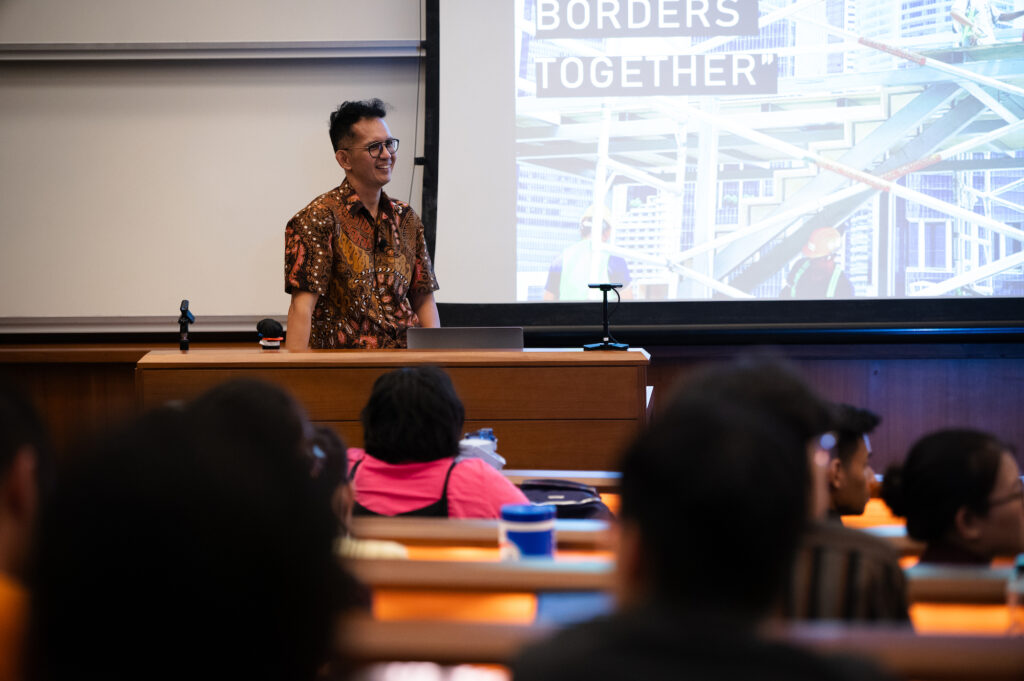Exploring cultural threads through migrant poetry and mysticism within Sufism
Yale-NUS College hosted lectures that shed light on the intricate tapestry of expression and inquiry

On 26 and 27 March 2024, Yale-NUS College Associate Professor of Social Sciences (Anthropology) Nur Amali Ibrahim and Associate Professor Seema Golestaneh of Near Eastern Studies at Cornell University, led talks on two thought-provoking subjects – migrant poetry and mysticism within Sufism. The first by Assoc Prof Nur Amali was titled ‘The Gifts of Poetry: Migrant Labor in Singapore, City of Good’ and explored how low-wage migrant workers in Singapore have become well-known for their poetic abilities in recent years.
Assoc Prof Nur Amali shared key themes from his book, Border Care: Migrant Labor in Singapore, City of Good, which examines the underlying reasons behind “acts of care” and solidarity towards migrant workers in Singapore. These “acts of care” include the presence of advocacy groups in Singapore dedicated to promoting the rights and well-being of migrant workers.
Assoc Prof Nur Amali went on to share about the emergence of migrant poetry in Singapore through the classic anthropological framework of the gift.
According to him, initiatives such as poetry competitions have transformed migrant poetry into what he termed “the gift of status” bestowed by the state. This recognition allows migrant workers to attain acknowledgment as artists, performers, writers, or community leaders. However, he emphasised that receiving this status does not negate their identities as migrant workers. Rather, it adds another layer to their roles. It enables a few selected workers to gain recognition and serve as a role model for others to express their grievances and frustrations through cultural channels. The poems in turn, present to Singaporeans “the gift of witnessing”, the ability to see the injustices occurring to migrant workers and the opportunity to do something about it.

Ashley Chin (Class of 2024), an Anthropology major, found the talk insightful, in particular the experiences of migrant poets from Bangladesh.
“I didn’t know that Bangladesh had this literary culture. I’ve only grown up in Singapore where poetry is a very middle to upper class activity. In Bangladesh, there’s such a prevalent culture of writing. That was something very interesting and I wished Singapore was more like that too.”
Assoc Prof Golestaneh, who served as the discussant of the talk, also noted this cultural difference between how poetry is viewed in Bangladesh versus Singapore. When discussing the context in Bangladesh, “poetry is seen as much more widespread for everyone. Even people who don’t have as much formal literary training, can compose poetry.” However, in Singapore poetry tends to be associated more with middle and upper classes as an elite art form.

The next day, Assoc Prof Golestaneh led her own lecture titled ‘Unknowing of Memory: Sufi Thought and the Emergence of a Wilful Amnesia in Iran’.
She opened the lecture by first unpacking the concept of “unknowing” within Sufism. She emphasised how mysticism is seen by Sufis not just as a transcendent phenomenon but as a practical approach to everyday life. Sufis believe that God is ultimately unknowable by humans. However, rather than seeing this as an obstacle to contemplation and knowledge, Sufis “instead see an opportunity for a new type of knowledge”. They position themselves at the limits of human understanding, accepting that there will always be more that cannot be known. Their epistemology is centred around an awareness of and engagement with what cannot be fully grasped or explained through conventional forms of knowledge.
Assoc Prof Golestaneh presented insightful case studies that demonstrated how the concept of “unknowing” influenced Sufis’ understandings in different aspects of life. One of which was how a Sufi gathering place was destroyed in February 2009 in the city of Isfahan in Iran and how the Sufis chose to actively and purposefully forget it rather than lament it and reject the material in favour of the spiritual.
When confronted, the Sufis took an active step to forget what had happened, in a process Assoc Prof Golestaneh termed “willful amnesia”. It demonstrated how unknowing manifests through consciously refusing memory and questioning what is known or said to be known. This is in contrast to the Iranian state’s practices of shaping collective memory through visual remembrances, such as murals, that aimed to remember past threats like the Iran-Iraq war.
“There’s a lot of visual culture, you see a lot of murals, billboards. And so, it seemed that would be kind of the opposite move of what the Sufis are doing – this group of Sufis at least – where they are saying ‘forget, forget, forget’”.
Both talks emphasised the significance of recognising and valuing diverse cultural and religious traditions. They illustrated the cultural differences and varied tapestry of the human experience – whether they were examining the artistic sides of migrant workers or the philosophy of Sufi mysticism. These talks, sponsored by the Yap Kim Hao Professorship in Comparative Religious Studies, served as a reminder of the universal aspects of human existence that cut across social and geographic boundaries.
Named after Reverend Doctor Yap Kim Hao, former Vice-President of the Inter-Religious Organisation (Singapore), who had been actively promoting inter-faith dialogue and understanding in Singapore since 1949, the Yap Kim Hao Professorship in Comparative Religious Studies is aimed at enhancing the academic study of religions at the College. Focusing on the multiple religious beliefs, practices and experiences in today’s world, the study of Comparative Religious Studies reflects the College’s broad based learning approach, where faculty and students are encouraged to conduct scholarship and research on a wide range of topics with a spirit of open inquiry and respectful sharing.





